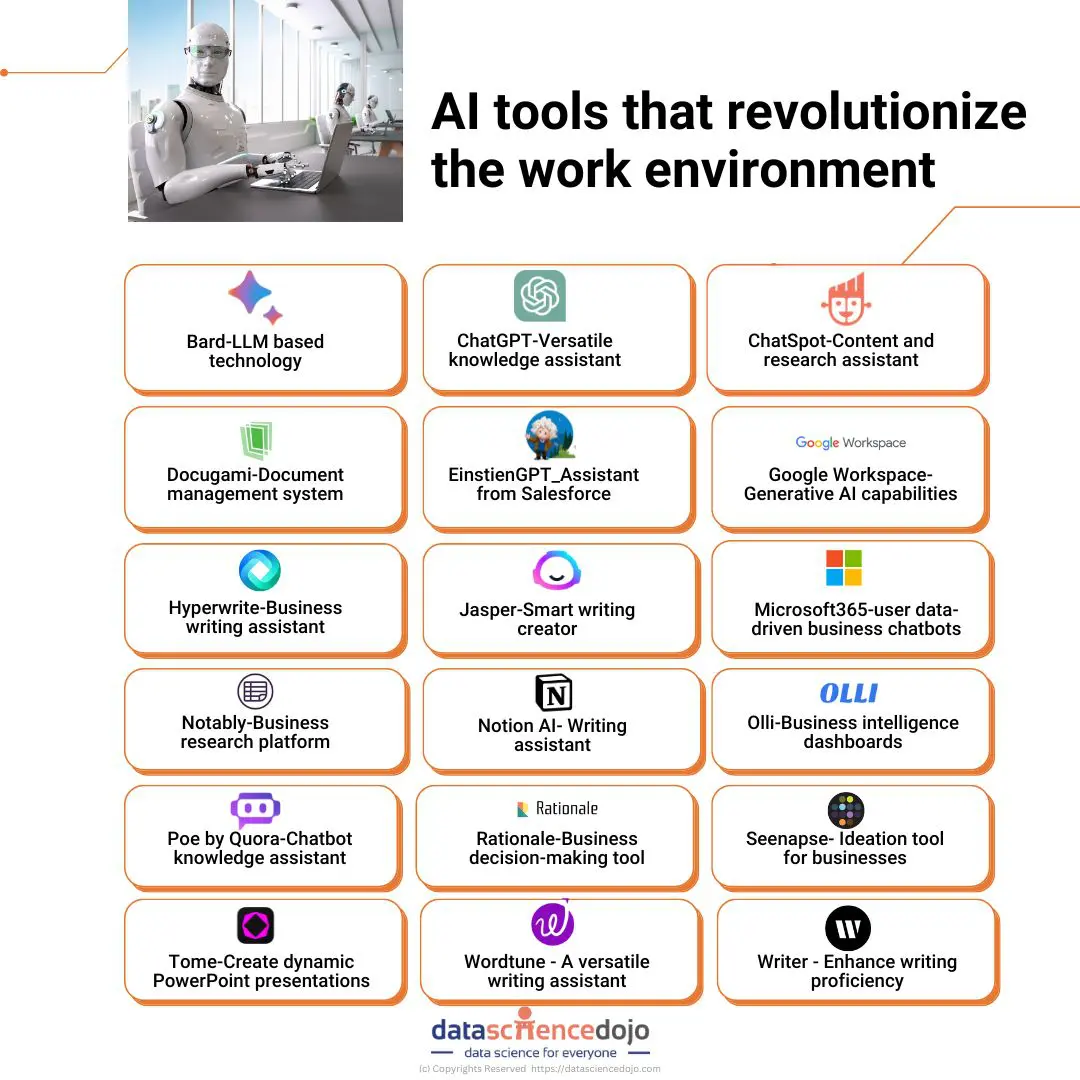Artificial intelligence (AI) is rapidly transforming the way we work. From automating repetitive tasks to generating creative content, work-related AI tools are widely helping businesses of all sizes to be more productive and efficient.

Here are some of the most exciting AI tools that can revolutionize your work environment:
- Bard is a knowledge assistant developed by Google that uses LLM-based technology to help you with tasks such as research, writing, and translation. [Free to use]
- ChatGPT is a versatile knowledge assistant that can be used for a variety of purposes, including customer service, marketing, and sales. [Free to use]
- ChatSpot is a content and research assistant from HubSpot that can help you with marketing, sales, and operational tasks. [Free to use]
- Docugami is an AI-driven business document management system that can help you organize, store, and share documents more effectively. [Free trial available]
- Einstein GPT is a content, insights, and interaction assistant from Salesforce that can help you improve your customer interactions. [Free trial available]
- Google Workspace AI Features are a suite of generative AI capabilities that are integrated into Google Workspace products, such as Docs, Sheets, and Slides. [Free to use]
- HyperWrite is a business writing assistant that can help you create clear, concise, and persuasive content. [Free trial available]
- Jasper for Business is a smart writing creator that can help you maintain brand consistency for external content. [Free trial available]
- Microsoft 365 Copilot/Business Chat are AI-enabled content creation and contextual user data-driven business chatbots. [Free trial available]
- Notably is an AI-assisted business research platform that can help you find and understand relevant information more quickly. [Free trial available]
- Notion AI is a content and writing assistant that is tailored for business applications. [Free trial available]
- Olli is an AI-generated analytics and business intelligence dashboard that is engineered for enterprise use. [Free trial available]
- Poe by Quora is a chatbot knowledge assistant that leverages Anthropic’s cutting-edge AI models. [Free trial available]
- Rationale is an AI-powered business decision-making tool that can help you to make more informed decisions. [Free trial available]
- Seenapse is an AI-supported ideation tool that is designed specifically for business purposes. [Free trial available]
- Tome is an AI-driven tool that empowers users to create dynamic PowerPoint presentations. [Free trial available]
- WordTune is a versatile writing assistant with broad applications. [Free trial available]
- Writer is an AI-based writing assistant that is designed to enhance writing proficiency and productivity. [Free trial available]
These are just a few of the many AI tools that are available to businesses today. As AI continues to evolve, we can expect to see even more innovative tools that can help us to work more efficiently and effectively.
Are AI tools a threat to the workforce?
AI tools can be a threat to the workforce in some cases, but they can also create new jobs and opportunities. It is important to consider the following factors when assessing the impact of AI on the workforce:
The type of work:
Some types of work are more susceptible to automation than others. For example, jobs that involve repetitive tasks or that require a high level of accuracy are more likely to be automated by AI.
The skill level of the workforce:
Workers with low-level skills are more likely to be displaced by AI than workers with high-level skills. This is because AI tools are often able to perform tasks that require a high level of accuracy and precision, which are skills that are often possessed by workers with high-level education and training.
The pace of technological change:
The pace of technological change is also a factor to consider. If AI tools are adopted rapidly, it could lead to a significant number of job losses in a short period of time. However, if AI tools are adopted more gradually, it will give workers more time to adapt to the changing landscape and acquire the skills they need to succeed in the new economy.
Overall, the impact of AI on the workforce is complex and uncertain. There is no doubt that AI will displace some jobs, but it will also create new jobs and opportunities. It is important to be proactive and prepare for the changes that AI will bring.
Mitigate the negative impact of AI tools
Here are some things that can be done to mitigate the negative impact of AI on the workforce:
Upskill and reskill workers:
Workers need to be prepared for the changes that AI will bring. This means upskilling and reskilling workers so that they have the skills they need to succeed in the new economy.
Create new jobs:
AI will also create new jobs. It is important to create new jobs that are specifically designed for the skills that AI will automate.
Provide social safety nets:
If AI does lead to significant job losses, it is important to provide social safety nets to help those who are displaced. This could include things like unemployment benefits, retraining programs, and job placement services.
By taking these steps, we can ensure that AI is used to benefit the workforce, not to displace it.
Who can benefit from using AI tools?
AI tools can benefit businesses of all sizes, from small businesses to large corporations. They can be used by a wide range of employees, including marketing professionals, sales representatives, customer service representatives, and even executives.
What are the benefits of using work-related AI tools?
There are many benefits to using AI tools, including:
- Increased productivity: AI tools can help you automate repetitive tasks, freeing up your time to focus on more strategic work.
- Improved accuracy: AI tools can help you to produce more accurate results, reducing the risk of errors.
- Enhanced creativity: AI tools can help you to generate new ideas and insights, stimulating your creativity.
- Improved customer service: AI tools can help you to provide better customer service, by answering questions more quickly and accurately.
- Increased efficiency: AI tools can help you streamline your operations, making your business more efficient.
Conclusion
AI tools are powerful tools that can help businesses to improve their productivity, accuracy, creativity, customer service, and efficiency. As AI continues to evolve, we can expect to see even more innovative tools that can help businesses succeed in the digital age. Learn more about Generative AI here.

